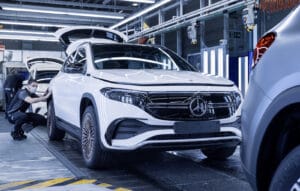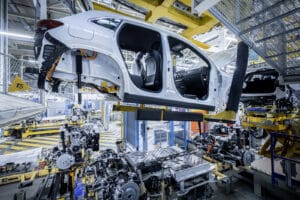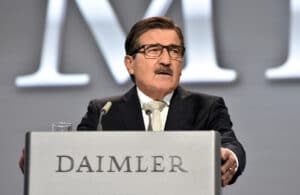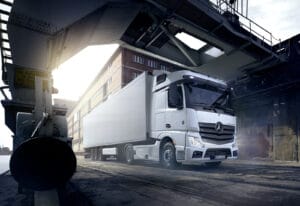
In an effort to pacify its habitually restless shareholders, Daimler AG will divide into two separate companies – one dedicated to passenger cars and the second to manage its heavy truck and bus business, which has long been part of the company’s structure.
“This is a historic moment for Daimler. It represents the start of a profound reshaping of the company. Mercedes-Benz Cars & Vans and Daimler Trucks & Buses are different businesses with specific customer groups, technology paths and capital needs,” said Ola Källenius, chairman of the Board of Management of Daimler and Mercedes-Benz.
Källenius said Mercedes-Benz and Daimler Truck offer industry leading transportation solutions and services to customers, they operate in industries that are facing major technological and structural changes. This presented some issues for the company.
“Given this context, we believe they will be able to operate most effectively as independent entities, equipped with strong net liquidity and free from the constraints of a conglomerate structure,” he said.
Third Quarter Targeted for Shareholder Approval

The split will not be complete until the third quarter but officials said the plans include a fundamental change in its structure that is designed “to unlock the full potential of its businesses in a zero-emissions, software-driven future,” according to a statement released by the company, which said the changes was approved earlier this week by the Management Board and Supervisory Board.
The company said more details will be released prior to an extraordinary shareholders meeting set for the third quarter.
While separate entities, the two new companies will retain the basic German character under the plan now being evaluated by Daimler’s existing management and supervisory companies.
Daimler said in its announcement that a significant majority stake in Daimler Truck will be distributed to Daimler current shareholders, which include Kuwait’s sovereign wealth fund and the Chinese automaker Geely.
The transaction and the listing of Daimler Truck on the Frankfurt stock exchange is expected to be complete before the end 2021. In addition, it is also Daimler’s intention to rename itself as Mercedes-Benz at the appropriate time.

When the split is complete, both companies will operate with individual management boards, comprised of each company’s senior executives and a supervisory, which under German law, will include outside directors and representatives of the employees from each company.
Daimler Executives Long Contemplated the Split
The change has been in the works for more than two years and Daimler took the first step last year when it set up a holding company that retained some financial control over its different groups, including Daimler Truck and Mercedes-Benz Cars and Vans.
As part of a more focused corporate structure, both Mercedes-Benz and Daimler Truck will also be supported by dedicated captive financial and mobility service entities, driving sales with tailor-made financing, leasing and mobility solutions, increasing retention and building customer loyalty. In this process, the company plans to assign resources and teams from today’s Daimler Mobility to both Mercedes-Benz and Daimler Truck.
“We have confidence in the financial and operational strength of our two vehicle divisions. And we are convinced that independent management and governance will allow them to operate even faster, invest more ambitiously, target growth and cooperation, and thus be significantly more agile and competitive,” Källenius said.
Move Increases Shareholder Value

Manfred Bischoff, chairman of the Supervisory Board of Daimler, said the planned market listing of Daimler Truck is an important step to create value. Daimler’s small shareholders in Germany have been sensitive over the years to the fluctuations of Daimler’s shares.
The failure of the Daimler-Benz merger with Chrysler Corp. can in part be traced back to the dissatisfaction of the small shareholders who said the merger diluted the value of their shares.
Bischoff said both Mercedes-Benz and Daimler Truck enter this transformation with significant strengths. “We are convinced they will emerge even stronger as independent companies, serving their respective customers,” he said.
However, with their different return profiles and capital needs, the rationale for two independent entities is evident. We are convinced that the capital markets will appreciate the opportunity to invest in more clearly focused, pure-play businesses, Bischoff noted.
The split also is expected to leave the company’s troubled and troublesome diesel business in the hands of Daimler Truck since the Mercedes-Benz cars is moving rapidly towards electrification.

Employees Endorse New Structure
The tentative split was given a boost when Michael Brecht, chairman of the Daimler’s General Works Council, and the top employee representative on the Supervisory Board, endorsed the plans. “The transformation of our industry is moving ahead quickly. In order for us to keep pace, we need to invest in innovations boldly and more quickly,” he said.
The split provides additional support for each facility and helps to secure employment. In addition, the labor agreements are unaffected, remaining in force until the end of the decade.
“The planned independence will bring Mercedes-Benz and Daimler Truck many advantages, and we will continue to do everything in our power to uphold the interests of our colleagues. We have the unique opportunity to proactively and sustainably shape our commercial vehicle sites — from production to the service business — in order to help write the next chapter of the Daimler Truck success story,” Brecht said.








is the spin off a taxable dividend?